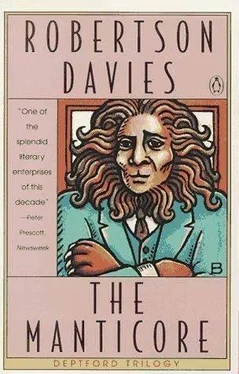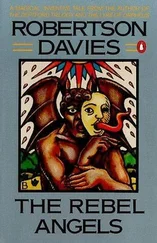I never saw Knopwood after that. What he meant when he said we would not meet again was soon explained; he had been ordered off to some more missionary work, and he died a few years ago in the West, of tuberculosis, working almost till the end among his Indians. I have never forgiven him for trying to blacken Father. If that is what his Christianity added up to, it wasn't much.
DR. VON HALLER: As you report what Father Knopwood said about Mrs. Martindale, he was abusive and contemptuous; did he know her, by any chance?
MYSELF: No, he just hated her because she was very much a woman, and I have told you what he was. He made up his mind she was a harlot, and that was that.
DR. VON HALLER: You don't think any of it was indignation on your behalf – because she had, so to speak, abused your innocence?
MYSELF: How had she done that? I think that's silly.
DR. VON HALLER: She had been party to a plan to manipulate you in a certain direction. I don't mean your virginity, which is simply physical and technical, but the scheme to introduce you to what Knopwood called the cheerful trumpet-and-drum, the simple music.
MYSELF: One has to meet it somehow, I suppose? Better in such circumstances than many we can imagine. I had forgotten the Swiss were so Puritanical.
DR. VON HALLER: Ah, now you are talking to me as if I were Father Knopwood. True, everybody has to encounter sex, but usually the choice is left to themselves. They find it; it is not offered to them like a tonic when somebody else thinks it would be good for them. May not the individual know the right time better than someone else? Is it not rather patronizing to arrange a first sexual encounter for one's son?
MYSELF: No more patronizing than to send him to any other school, so far as I can see.
DR. VON HALLER: So you are in complete agreement with what was arranged for you. Let me see – did you not say that the last time you had sexual intercourse was on December 26, 1945? – Was Mrs. Martindale the first and the last, then? – Why did you hesitate to put this valuable instructio to further use? – Take all the time you please, Mr. Staunton. If you would like a glass of water there is a carafe beside you.
MYSELF: It was Judy, I suppose.
DR. VON HALLER: Yes. About Judy – do you realize that in what you have been telling me Judy remains very dim? I am getting to know your father, and I have a good idea of Father Knopwood, and you implied much about Mrs. Martindale in a very few words. But I see very little of Judy. A well-bred girl, somewhat foreign to your world, Jewish, who sings. Otherwise you say only that she was kind and delightful and vague words like that which give her no individuality at all. Your sister suggested that she was cowlike; I attach quite a lot of significance to that.
MYSELF: Don't. Carol is very sharp.
DR. VON HALLER: Indeed she is. You have given a sharp picture of her. She is very perceptive. And she said Judy was cowlike. Do you know why?
MYSELF: Spite, obviously. She sensed I loved Judy.
DR. VON HALLER: She sensed Judy was an Anima-figure to you. Now we must be technical for a little while. We talked about the Anima as a general term for a man's idea of all a woman is or may be. Women are very much aware of this figure when it is aroused in men. Carol sensed that Judy had suddenly embodied the Anima for you, and she was irritated. You know how women are always saying, "What does he see in her?" Of course what he sees is the Anima. Furthermore, he is usually only able to describe it in general terms, not in detail. He is in the grip of something that might as well be called an enchantment; the old word is as good as any new one. It is notorious that when one is enchanted, one does not see clearly.
MYSELF: Judy was certainly clear to me.
DR. VON HALLER: Even though you do not seem to remember one thing she said that is not a commonplace? Oh, Mr. Staunton – a pretty, modest girl, whom you saw for the first time in enchanting circumstances, singing – an Anima, if ever I heard of one.
MYSELF: I thought you people weren't supposed to lead your witnesses?
DR. VON HALLER: Not in Mr. Justice Staunton's court, perhaps, but this is my court. Now tell me; after your talk with your father, in which he referred to Judy as "your little Jewish piece", and your talk with her father, when he said you must not think of Judy as a possible partner in your life, and after your talk with that third father, the priest, how did matters stand between you and Judy?
MYSELF: It went sour. Or it lost its gloss. Or anything you like to express a drop in intensity, a loss of power. Of course we met and talked and kissed. But I knew she was an obedient daughter, and when we kissed I knew Louis Wolff was near, though invisible. And try as I would, when we kissed I could hear a voice – it wasn't my father, so don't think it was – saying "your Jewish piece". And hateful Knopwood seemed always to be near, like Christ in his sentimental picture, with His hand on the Boy Scout's shoulder. I don't know how it would have worked out because I had rather a miserable illness. It would probably be called mononucleosis now, but they didn't know what it was then, and I was out of school for a long time and confined to the house with Netty as my nurse. When Easter came I was still very weak, and Judy went to Lausanne to a school. She sent me a letter, and I meant to keep it, of course, but I'll bet any money Netty took it and burned it.
DR. VON HALLER: But you remember what it said?
MYSELF: I remember some of it. She wrote, "My father is the wisest and best man I know, and I shall do what he says." It seemed extraordinary, for a girl of seventeen.
DR. VON HALLER: How, extraordinary?
MYSELF: Immature. Wouldn't you say so? Oughtn't she to have had more mind of her own?
DR. VON HALLER: But wasn't that precisely your attitude toward your own father?
MYSELF: Not after my illness. Nevertheless, there was a difference. Because my father really was a great man. Dunstan Ramsay once said he was a genius of an unusual, unrecognized kind. Whereas Louis Wolff, though very good of his kind, was just a clever doctor.
DR. VON HALLER: A very sophisticated man; sophisticated in a way your father was not, it appears. And what about Knopwood? You seem to have dismissed him because he was a homosexual.
MYSELF: I see a good many of his kind in court. You can't take them seriously.
DR. VON HALLER: But you take very few people seriously when you have them in court. There are homosexuals we do well to take seriously and you are not likely to meet them in court. You spoke, I recall, of Christian charity?
MYSELF: I am no longer a Christian, and too often I have uncovered pitiable weakness masquerading as charity. Those who talk about charity and forgiveness usually lack the guts to push anything to a logical conclusion. I've never seen charity bring any unquestionable good in its train.
DR. VON HALLER: I see. Very well, let.us go on. During your illness I suppose you did a lot of thinking about your situation. That is what these illnesses are for, you know – these mysterious ailments that take us out of life but do not kill us. They are signals that our life is going the wrong way, and intervals for reflection. You were lucky to be able to keep out of a hospital, even if it did return you to the domination of Netty. Now, what answers did you find? For instance, did you think about why you were so ready to believe your mother had been the lover of your father's best friend, whereas you doubted that Mrs. Martindale had been your father's mistress?
MYSELF: I suppose children favour one parent more than the other. I have told you about Mother. And Father used to talk about her sometimes when he visited me when I was ill. Several times he warned me against marrying a boyhood sweetheart.
Читать дальше












